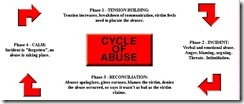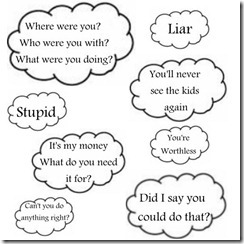Emotional abuse is a type of domestic abuse that uses fear, humiliation, intimidation or manipulation to brainwash, resulting in low self-confidence, self-worth and a loss of personal value for those who are abused. Others notice that the abused person no longer seems like themselves and exhibits may of the general symptoms of domestic abuse.
Emotional abuse can be more hurtful than physical abuse because the scars are deeper and longer lasting. This type of abuse wears away at a person’s sense of self and causes the person to stop trusting their own perceptions. It becomes like a mind-game. Over time, the abused person has such low self-esteem that they start to blame themselves for the abuse. Emotional abuse needs to be taken very seriously; it is called “pre-battering behavior” because in many cases it can escalate to physical abuse.
 Abusers can be male or female and those fwho are abused, regardless of gender, experience the same effects of emotional abuse, such as depression, anxiety, making excuses for the abuser and feeling like they have no right to speak up.
Abusers can be male or female and those fwho are abused, regardless of gender, experience the same effects of emotional abuse, such as depression, anxiety, making excuses for the abuser and feeling like they have no right to speak up.
The abuser is often friendly, loving or charming at the beginning and slowly starts exhibiting abusive symptoms over time. If you look back at Nina and Rakesh’s relationship, isolated incidents may not seem very serious, but over time Rakesh’s behavior became worse and worse. Abusers, such as Rakesh, manipulate by reconciling, apologizing and improving their behavior immediately after an incident to keep you in the relationship.
The following are types of emotional abuse:
Unreasonable Expectations
The abuser demands that you put everything else aside to tend to their needs. This can include a demand for constant attention or that you spend all of your free time with them. Regardless of what you do, it will never be enough and you may be criticized or berated because you don’t fulfill all of their needs.
In Nina’s story, Rakesh’s expectation that Nina change her life plans (such as changing her career dreams, canceling dinner with friends who she rarely sees, etc.) so they matched what he wanted is an example of unreasonable expectations.
Aggressing
This includes name-calling, accusing you of causing problems, blaming, threatening and ordering you around. Abusers will often blame you for causing their emotional outburst or for creating problems in your relationship. This serves to increase your self-doubt because they know as long as you are considering yourself to be part of the problem they will always have control over you.
The person might also disguise their behavior as “helping you” but this aid comes with constant criticizing, advising, and offering solutions all of which function to belittle you and maintain the position that the abuser knows best.
Denying and Forgetting
Emotional abusers can deny your emotional needs in order to hurt, punish or humiliate you. In addition, abusers can deny or “forget” that an event occurred. For example, if you confront the person about something they did or said that was hurtful, they often respond with, “I never said that”, “I don’t remember doing that” or “I don’t know what you’re talking about” even though you know that the event occurred.
Denial and “forgetting” is used to confuse you and to make you doubt your perceptions with the hope that you will no longer confront the abuser. It also functions to lower your self-esteem because you begin to feel like you cannot trust your own mind.
Denial and forgetting is common in passive aggressive behavior which, if used consistently as a form of communication, is a type of emotional abuse.
Dominating
 If they want to control your actions such as how much money you have, access to a car or to the phone, how you behave or dress etc., that is a form of emotional abuse. Isolating you from your friends, coworkers and family is a type of dominating behavior.
If they want to control your actions such as how much money you have, access to a car or to the phone, how you behave or dress etc., that is a form of emotional abuse. Isolating you from your friends, coworkers and family is a type of dominating behavior.
At the beginning of their relationship, Rakesh would grab Nina’s hand in a way to control her behavior in public. He also did this by demanding that Nina dress a certain way and that she spend less time with her friends .
Emotional Blackmail
When someone plays on your fear, guilt, compassion, or values to get what they want, they are emotionally abusing you. For example, if you are afraid of being alone, they may threaten to leave you if they do not get what they need.
In Nina’s story, Rakesh forced career-driven Nina to change her future plans so that they can be together. In addition, he became very jealous of Nina’s relationship with male classmates or friends. He played on her compassion, knowing that if he expressed his feelings, she would do anything to change her life for him.
Invalidation and Minimizing
When the abuser refuses to or fails to acknowledge reality (such as through denial), they are trying to undermine your perception of the world in order to maintain control over you. For example, if you express your hurt by what they did, they might respond by saying, “You’re too sensitive” or “That’s not hurtful, you shouldn’t feel that way.” Minimizing your experience by saying something like “You’re blowing this out of proportion” also makes you question your perceptions so that eventually you will begin to mistrust them.
Unpredictable Responses
Mood swings or sudden emotional outbursts is a form of emotional abuse because the behavior puts you on edge all the time. You become hypervigilant and are always waiting for the next outburst. Telling you that they like something one day and saying the opposite the next day or reacting very differently to the same behavior from you are all examples of emotional abuse by unpredictable response.
Nina had started walking on eggshells to not set Rakesh off, which is a tell-tale sign that the abuser is using unpredictable response to control you. After Rakesh’s outburst, it was her clue that something really terrible has been happening. She finally noticed what other people had been seeing, that over time Rakesh had become more and more emotionally abusive.
Verbal Assaults
This includes berating, belittling, criticizing, name calling, screaming and threatening you regardless of the content of the assault. Excessive blaming, using sarcasm and humiliation, pointing out your flaws especially in public are all types of verbal assaults used in emotional abuse. Sometimes these assaults are disguised as jokes, especially in social situations. Over time, this erodes your self-esteem and confidence.
If you or someone you know is in an abusive situation, please contact a domestic abuse agency to learn how to safely remove yourself from the situation. (For a list of Domestic and Family Abuse agencies, please see MySahana’s Resources page.)
Remember that love and relationships should never hurt your mind, body or spirit.
We would love to hear your response to this article! Please feel free to leave a comment below!
